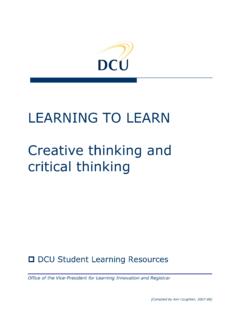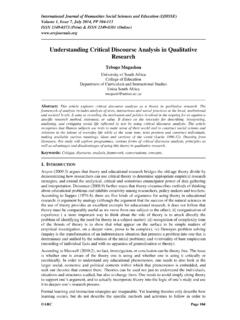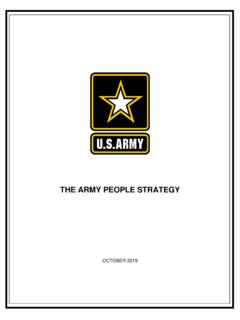Transcription of The Role of Critical Thinking in Academic - ed
1 IOJPE ISSN: 1300 915X. International Online Journal of Primary Education 2019, volume 8, issue 1. THE ROLE OF Critical Thinking IN Academic WRITING: AN. INVESTIGATION OF EFL STUDENTS' PERCEPTIONS AND WRITING. EXPERIENCES. Muneeba Tahira Pir Mehr Ali Shah Arid Agriculture University Rawalpindi, Pakistan Orcid: Ghulam Haider Dr., Academy of Educational Planning&Management (AEPAM), Ministry of Federal Education&Professional Training, Islamabad, Pakistan Orcid: Received Date: 14-03-2019 Accepted Date: 11-07-2019 Published Date: 30-07-2019. Abstract It is generally considered that evidence of Critical Thinking , as expressed through argumentation, is central to successful Academic writing at Western universities. However, the concept of Critical Thinking is complex: its nature is difficult to define and students, especially those coming from non-Western' backgrounds, are perceived to have difficulty in implementing a Critical dimension in their writing.
2 The present study, based on the use of in-depth interviews with three postgraduate students, presents findings on the students' interpretations of Critical Thinking , the factors which they perceive to affect the implementation of Critical Thinking , and the perceptions of their development as Critical thinkers. The findings show that the students, despite coming from different traditions of discourse, have a fairly comprehensive understanding of Critical Thinking and willingly engage with it. The findings also reveal that although cultural background plays a role in influencing their writing styles, the students have the capacity to learn and master a new discourse. The problems they encountered were due to uncertainty in demonstrating an argument, insufficient subject knowledge, and problematic issues surrounding the essay genre, such as authorial voice and assessment demands. Implications for university departments and tutors are that they should review their writing instruction and guidelines so as to make the requirements of argument more explicit and easily understandable, and in the long term, to reevaluate the norms of the traditional essay form to accommodate a wider spectrum of expression.
3 Keywords: Critical Thinking , Academic Writing, EFL Students 1. Introduction Critical Thinking is arguably one of the central requirements and desired outcomes in Western'. universities. The international student population is expected to adopt the established Western Academic discourse in order to meet the requirements of successful writing at university and to be able to claim membership in that community. This means that they are required to show evidence of Critical Thinking in their Academic essays in the form an argument, and by demonstrating related skills such as evaluation and analysis. However, students are either unaware of the importance of argumentation in writing or lack understanding of what is meant by the concept of argument, evaluation and analysis (Jones 2007, Wingate 2011). In a study on the experiences of a group of non-traditional' students in higher education, Lillis and Turner (2001) found that a recurring theme is that of student confusion about what is expected from them in terms of Academic writing.
4 As Andrews (2003, p. 120) points out, When there is a mismatch between tutors' and students' expectations, trouble can ensue . The reason for the trouble - ie. students' inability to write in the ways the academy requires - has been the focus of much scholarly research and debate. Sections of the literature have focused on the background of international students viewing certain cultures, especially Confucius-heritage cultures, as a barrier to the acquisition of Critical and analytical Copyright International Online Journal of Primary Education 1. IOJPE ISSN: 1300 915X. International Online Journal of Primary Education 2019, volume 8, issue 1. skills (Ramanathan and Kaplan 1996b, Atkinson 1997, Ramanathan and Atkinson 1999). Others, such as Elander et al. (2006) and Jones (2007) have argued that international students may fail to demonstrate Critical Thinking due to the university not explaining and teaching its discourse practices and conventions explicitly enough.
5 The above discussions can offer valuable perspectives on the nature and practice of Critical Thinking in higher education, and will be discussed in more detail in the review of the literature. However, in order to gain a fuller understanding of the issues and complexities surrounding Critical Thinking , we need to obtain an insider's', or emic perspective. Given the importance of demonstrating a Critical approach in writing, it is surprising, as Wingate (2011) points out, that there has not been more research on students' perceptions and experiences of the challenges in implementing Critical Thinking in Academic writing. Through conducting a small-scale qualitative research project I aim to capture significant understandings, concerns and issues of a small group of participants in the context of a postgraduate degree programme at a British university. The focus of the investigation is on student perceptions and experiences rather than assessing or analyzing their Critical Thinking skills, or evaluating the success of university instruction of Critical Thinking .
6 My role as both researcher and fellow student gives me an advantageous insider's' vantage point from which to foreground my fellow students' voices which might not otherwise be heard. The aim of the study is to glean some insights into the learning experiences and challenges that international students meet as they adapt to a new Academic discourse. By highlighting these particular complexities, I hope to raise awareness amongst the Academic staff and offer some suggestions as to better facilitate the students'. expression and development of Critical Thinking in Academic writing. In order to establish a background and a frame of reference for the study, I will review a range of research and theorising about the nature and significance of Critical Thinking , and the perceived difficulties in implementing it in writing. After discussing the methodological approaches which underline the study, I. will present the findings of a small-scale research project.
7 The findings will be examined with reference to their correspondence with those of the existing literature, and will be organised and discussed under key themes which emerged during the data analysis. There then follows a discussion synthesising the main findings, issues and concerns in answer to the questions the research set out to explore. Finally, the conclusion will bring together the most pertinent insights which emerged from the research and outline some implications for Academic departments. 2. Literature Review Research on Academic composition has increasingly questioned the nature and value of Critical Thinking in anglophone Academic practices, much of it focussing on the challenges which international students face in developing and implementing a Critical dimension in their writing (see Zamel 1993, 1995, Fox 1994, Casanave 2004). In order to provide a relevant context to examine these challenges, I will first explore some of the complexities in understanding the concept of Critical Thinking and discuss its role in anglophone Academic discourse.
8 Next, I will provide an overview of the two main bodies of theory underpinning Critical Thinking . In the final section, I will review the main difficulties associated with expressing criticality in writing. Copyright International Online Journal of Primary Education 2. IOJPE ISSN: 1300 915X. International Online Journal of Primary Education 2019, volume 8, issue 1. The nature of Critical Thinking Even though the words Critical Thinking ' convey a general idea of what it entails, it remains a concept over which there is much uncertainty and contention about what it encompasses and how it is manifested. This is evident by the numerous ways it is defined. In broad terms Critical Thinking is viewed as a cognitive skill related to rational judgement, defined as the educational cognate of rationality Siegel (1988 in Jones 2005), reflexive skepticism (McPeck 1981). and Critical self-reflection (Barnett 1997 in Tapper 2004, p.)
9 201). Toulmin, Rieke and Janik (1984 in Andrews 2000, ) associate Critical Thinking with reasoning, used for the central activity of presenting reasons in support of a claim. This type of logical argumentation can be taught through syllogisms (Davies 2008), but as Wingate (2011) points out, syllogisms are mostly suitable for single claims, rather than for the large-scale structure of the essay. When it comes to university contexts, Critical Thinking is defined in terms of abilities or skills such as selection, evaluation, analysis, reflection, questioning, inference and judgement (Tapper 2004). Despite the many diverging views on the nature of Critical Thinking , there is consensus in the literature that Critical Thinking is exhibited through the students' abilities to identify issues and assumptions, recognise important relationships, make correct inferences, evaluate evidence or authority, and deduce conclusions.
10 (Tsui 2002, ). When Critical Thinking is applied to writing, the above abilities are expressed through the process of argumentation, producing an argument the essay, the dissertation. Argument can be defined as a connected series of related ideas intended to establish a position and implying response to another (or more than one) position (Andrews 1995, ). Argument is regarded as the primary expression of Critical Thinking in higher education (Andrews 1995, Scott 2000), and the defining feature of the essay (Elander et al. 2006). As Bonnett (2001, ) emphasizes: Your essay is your argument, everything else makes sense because of it . Despite the importance of presenting an argument in Academic writing, students still lack an understanding of its implementation or labour under misconceptions. Elander et al. (2006) point out that in a previous study the majority of the students felt that argumentation means presenting their own original views or opinions.












